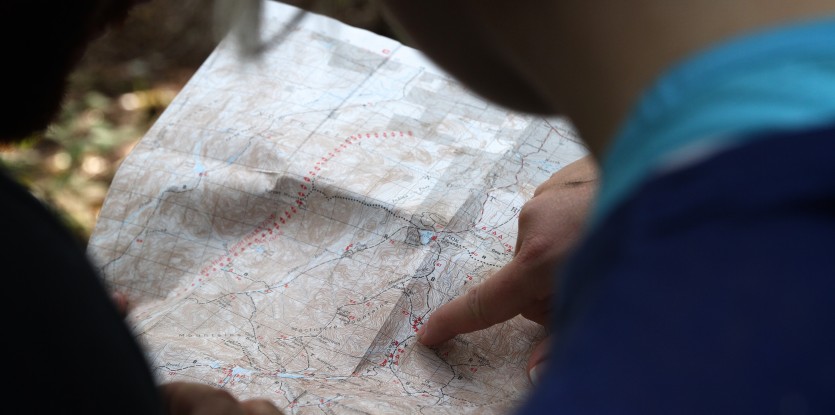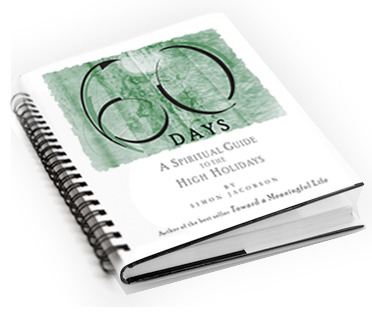The Lost Art of Prayer
After several weeks of discussing “heavy” intellectual topics, which as some of you have reminded me “can strain any mind,” my heart is in need of some soothing.
Thank G-d that we are, after all, in the month of love and compassion – the month of Elul, when “I am to my beloved and my beloved is to me.”
It was a difficult week, but then which week is not. When your life is blessed with trying to help people, you will see much joy, but will also inevitably be exposed to much pain.
So much pain, so much senseless loss. Far too many tears. Just this week two grieving parents asked me to visit their dying son – a gentle soul of 12, his insides being eaten up by the disease whose name we dare not speak. Another day brings me to the home of a student who has lost all faith and hope witnessing his father’s deterioration as his mind succumbs to Alzheimer’s.
In one community a family is grieving for a child who committed suicide. In another, a woman, single and alone, shares with me how her parents have abandoned her from the youngest age (it doesn’t help to tell her that they have abandoned each other and themselves as well).
Each soul a universe. Each sufferer reflecting not one person’s pain, but all our pains. Death, loss, hopelessness – abundant commodities wherever you go.
And then, every week brings its share of singles (or ex-singles) desperate for a working relationship. Years go by, careers built, money earned, portfolios diversified – but all alone, unhappy, compensating in all possible (often destructive) ways, anything to relieve some of the loneliness of life.
Mentioning money – I look around and wonder if all the wealth generated today are bringing families closer, adding love or calming souls?
So much selfishness and insecurity, and all the complex mechanisms that obscure the ugliness of it all.
Lest we forget, there is much beauty around us. My week was not just consumed by misery. I also attended several weddings. Seeing families and friends dancing away gives one much hope. Ahh, how glorious to witness beaming parents and grandparents reaping the rewards of walking their children to the chuppah.
But then, someone can’t resist reminding me of the divorce rate…
If one is to look at the face of all the pain suffering of the world it would be impossible to bear. We must have distractions, selective hearing and denial to cope. But from time to time, a sensitive soul senses the agony beneath the thick shrouds. And it weeps. The Arizal says that:
“one who does not cry in the ten days of Teshuvah (between Rosh Hashana and Yom Kippur) his souls is not complete.”
Tears bathe the soul; balm for the spirit.
I am sorry if my words cause anyone to be sad. My intention is actually to share from the heart some of the feelings we all experience from time to time, and try to find ways to deal with the emotions that affect our daily existence.
Because, after all, real life plays itself out not in the realm of the mind, but in the recesses of the heart – the complex, inconsistent, subjective feelings that carry all our life’s experiences, both conscious and unconscious.
Is it possible to develop our feelings and emotions? We all know that we can cultivate our minds through study and education, through books and conversations, through mental challenges and rigorous work. But can we learn how to love? Can we expand the horizons of our emotional lives, or are we bound to their pre-wired personalities?
The answer is: Yes we can grow emotionally and nurture our hearts. The way to do so is through prayer. And the best time in the year to begin is now – in the month of Elul, preceding the New Year.
In the current month of Elul, over 3,000 years ago, Moses climbed the mountain (Sinai) to pray and beseech G-d for forgiveness. He finally prevailed on Yom Kippur.
Time is like a spiral. Every year during this period the same energy flows imbuing us with the power to recreate Moses’ journey. During Elul we can learn how to pray.
“What is prayer?” asks the Talmud, and answers “service of the heart.” Prayer – that most elusive and necessary tool – is emotional exercise, teaching us how to emote, how to access our feelings, how to communicate and develop them.
Our schools, at best, teach us how to think, how to formulate and organize ideas, how to nurture our strengths. Conventional education is primarily about developing the mind, with some (if at all) focus on behavioral improvement. Usually, emotions are dealt with when crisis strikes. If we grow up in healthy homes, healthy emotions of our parents and families affect us by osmosis. But if not, our education systems don’t really address our emotional wellbeing, unless there is a problem.
But just as intellectual development requires hard work, so does emotional development. And even more so considering the shrouded, subjective, tangled world of our feelings.
Love is emoting. Prayer teaches us how to emote; how to express feelings – to G-d, to our own souls, and by extension – to others.
In my life I have seen – not often enough, but enough to make an impact – a Chassid pray. Wrapped under a talit (prayer shawl), for hours on end, the Chassid would be transported to another world. Sometimes with a gentle melody and sometimes with a tear, the praying Chassid would pour out his heart and soul – in deep longing and yearning for something higher.
This was no lip service; no mechanical program. This was the real thing.
I actually composed, many years ago, a few words to describe the scene:
Midst forests of green
Of beauty serene
Echoes of silence vibrating the scene
‘Twas tranquil and clear
Birds perched in fear
For strange did the quiet appear
A man sits alone
On a throne of stone
His heart calling out
With neither cry nor shout
I long
I search
I yearn
And the heavens above
Respond to his love
They open their doors
To the souls’ outpours
Blessings and tears
Mix into one
As above and below
Merge in one glorious flow
From whom do we learn how to pray? From Moses who was trained to pray by G-d Himself in the month of Elul and Tishrei. The first forty days on Mt. Sinai Moses learned how to study Torah. The next eighty days he learned how to pray.
And the Torah documents in powerful detail what he learned. How G-d taught him the secret of reaching the deepest recesses of the heart and soul, and access the deepest dimensions of Divine compassion. G-d revealed him the mystery of the thirteen Divine attributes of compassion, which contain enormous power. G-d showed Moses the Divine “personality.”
As the Midrash explains: King David was aggrieved for the sake of Israel and asked: “How will they attain atonement for their iniquities?” G-d answered:
“David, do not be distressed, for I already disclosed to Moses the sidrei selichah [the orders of prayers for forgiveness] and I said to him: When troubles come upon Israel because of their iniquities, let them stand before Me as one band and utter the seder selichah, and I will respond to them.” “How did G-d disclose this? [With the verse] ‘And G-d passed before him and proclaimed…’ (Exodus 34:6). This teaches that G-d came down out of His thick cloud like an emissary of the congregation who wraps himself in his talit and descends to face the Ark [to read the prayers], and thus disclosed to him the seder selichah” (Eliyahu Zutta, ch. 23).
From Moses we learn and glean power how to pray. For this reason, “during Elul, even those immersed full time in Torah study, take off some time from their study to increase their prayers and supplications” (Birchei Yosef, cited in Mateh Efraim, Elef l’matoh 581:13).
Now is the time of year when we need to train ourselves to pray, to emote – to speak from the heart, not merely from the head or mouth.
So when we feel pain and despair (our own or of others) it is time to pray. [Obviously, in addition to anything we can do to alleviate the problem].
In deep pain perhaps we can begin to understand just a bit Moses’ plea to G-d “show me your glory.” Requests like that can only be made in deep anguish. And that’s when they can find answers.
As we stand in the final days of the month of compassion (Elul) and we recreate the journey of Moses, we can find empathy and a bit of mercy on our tortured souls.
Read closely and personalize the special Psalm recited during this period:
“G-d is my light and my salvation. Whom shall I fear? G-d is the strength of my life. Whom shall I dread?”
When faced with adversaries and oppressors, ready to “devour my flesh,” they will “stumble and fall.”
“My head will be raised… I will sing and chant… Lord, hear my voice as I call; be gracious to me and answer me. 8. In Your behalf my heart says, ‘Seek My countenance;’ Your countenance, G-d, I seek. Do not conceal Your countenance from me.”
And if you have issues with your parents –
“Though my father and mother have forsaken me, the Lord has taken me in. Lord, teach me Your way and lead me in the path of righteousness, because of my watchful enemies.”
“Do not give me over to the will of my oppressors, for there have risen against me false witnesses, and they speak evil. [They would have crushed me] had I not believed that I would see the goodness of the Lord in the land of the living.”
Immortal power comes from trust in the Higher force of the Divine –
“Hope in the Lord, be strong and let your heart be valiant.”
If you were to ask for one thing, “achas sho’alti,” ask for this: “One thing I have asked of the Lord, this I seek: that I may dwell in the House of the Lord all the days of my life, to behold the pleasantness of the Lord, and to visit His Sanctuary.”
* * *
Several years ago, on Rosh Hashana night, a good man, who recently passed away, shared with me his childhood memories of Rosh Hashana back in Europe in the late 1940’s. As a child he was watching different devout Jews praying on the first night of the Jewish New Year – a night known for special devotion, as it sets the tone for the entire year.
One man, he tells me, was shaking and crying. Another was in deep thought, his eyes tightly clenched. And finally – the one that made the greatest impact on his impressionable heart – was a man who seemed to be having a conversation; a conversation with G-d.
“That man,” he tells me, “was your grandfather and namesake.”
Lump. If only I could have a conversation like that. I have a few things to discuss.









Be strong and of good courage Rabbi Simon. I pray sowed back to you 10 times over what you pour into others. Amen
Be strong and of courage Rabbi. I pray strength sowed into you 10 times over what you sow into others. Amen
Great words and very lovely poem.